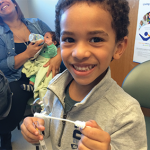
BOSTON—Eight pediatric academic centers have collaborated since 2009 to develop an open-science community that shares electronic medical record data to help them take better care of their patients. PEDSnet is one of the several clinical data research networks funded by the Patient-Centered Outcomes Research Institute (PCORI) that are dedicated to the mission of helping people make informed healthcare decisions.
During the session, Translating Patient-Centered Outcomes to the Real-World Setting, at the ACR/ARHP Annual Meeting in Boston in November 2014, Charles Bailey, MD, PhD, said that each patient encounter is an opportunity to “learn from this patient how to take better care of other patients.”
With the overall goal of patient-centered outcomes research, PEDSnet is building a network for sharing standardized clinical data, capturing longitudinal data and maintaining reliable interoperability between other research networks. By participating in a collaboration designed for continuous improvement, healthcare professionals can continue to “uphold the trust that patients place in us as clinicians,” said Dr. Bailey, assistant professor of clinical pediatrics at the Children’s Hospital of Philadelphia.
Structured data are captured at every encounter, an essential part of the clinical data research network that provides the necessary infrastructure to its members, according to research published by Dr. Bailey and colleagues.1 “As the underlying digital infrastructure to a [learning health system], PEDSnet will enable the rapid implementation of new evidence into clinical practice and will address fundamental questions of clinical effectiveness for children and their families, particularly for individuals affected by serious, and generally rare, illness that persists into adulthood.”1
Opportunities for Observational Research
PEDSnet includes eight children’s hospital health systems; patient-power research networks (PPRNs) that focus on pediatric inflammatory bowel syndrome, hypoplastic left heart syndrome and child obesity; and two national data partners.
‘The model…works,’ Dr. DeWitt said. It focuses on outcomes because ‘you don’t know how you are doing unless you measure it.’
Sharing electronic health record (EHR) data enables observational research that has broad depth and breadth, with information about a diverse population of patients in a real-world setting. This “pediatric learning health system” is forming communities of patients, families, clinicians, researchers and health system leaders who work to produce and use healthcare data generated in routine clinical care settings and to facilitate observational research and clinical trials based on those data. Most importantly, PEDSnet depends on the active participation of patients and their families. Success of the collaboration is dependent on the impact the system can have on the lives of patients and what is important to them and their families, Dr. Bailey said.



